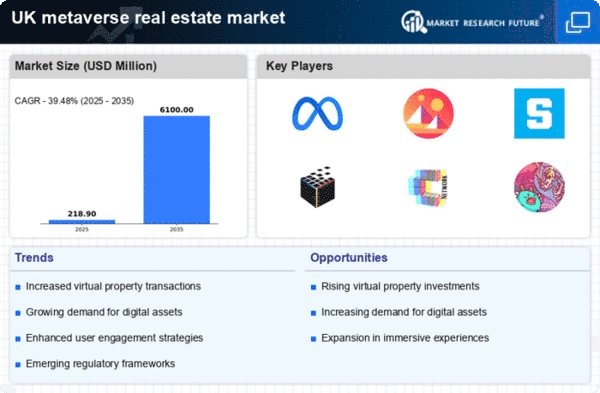Increased Demand for Digital Assets
The metaverse in-real-estate market is witnessing a notable increase in demand for digital assets, driven by a growing interest in virtual land and properties. In the UK, the value of virtual real estate transactions has reportedly surged by 50% in the last year, reflecting a shift in investment strategies. Investors are increasingly viewing digital properties as viable assets, akin to traditional real estate. This trend is further fueled by the rise of virtual events and experiences, which create a need for digital spaces. As more individuals and businesses seek to establish a presence in the metaverse, the demand for virtual properties is expected to continue its upward trajectory, significantly impacting the metaverse real estate market.
Rise of Collaborative Virtual Spaces
The metaverse in-real-estate market is increasingly characterized by the emergence of collaborative virtual spaces, where users can interact and engage in shared experiences. This trend is particularly relevant in the UK, where businesses are exploring virtual environments for meetings, events, and social interactions. The demand for such spaces is likely to drive the development of virtual properties designed for collaboration. As companies recognize the benefits of virtual collaboration, the need for dedicated spaces within the metaverse is expected to grow. This shift not only enhances the appeal of virtual real estate but also positions the metaverse real estate market as a key player in the future of work and social interaction.
Regulatory Developments and Compliance
The metaverse in-real-estate market is influenced by ongoing regulatory developments that aim to establish a framework for virtual property transactions. In the UK, authorities are beginning to address the legal implications of digital real estate, which may include taxation and ownership rights. As regulations evolve, compliance will become a critical factor for investors and developers operating in the metaverse. The establishment of clear guidelines could enhance investor confidence, potentially leading to increased participation in the market. Furthermore, as the legal landscape becomes more defined, it may attract institutional investors who are currently hesitant due to uncertainties surrounding the metaverse real estate market.
Investment from Traditional Real Estate Firms
The metaverse in-real-estate market is increasingly attracting investment from traditional real estate firms, which are beginning to recognize the potential of virtual properties. In the UK, several established real estate companies have started to allocate resources towards developing virtual assets, indicating a shift in investment strategies. This trend suggests that traditional firms are not only diversifying their portfolios but also adapting to changing market dynamics. As these firms leverage their expertise in real estate to navigate the metaverse, their involvement could lead to increased legitimacy and stability within the market. Consequently, this influx of investment may catalyze further growth in the metaverse real estate market.
Technological Advancements in Virtual Reality
The metaverse in-real-estate market is experiencing a surge in technological advancements, particularly in virtual reality (VR) and augmented reality (AR). These technologies enhance user experiences by allowing potential buyers to explore properties in immersive environments. In the UK, the adoption of VR tools has increased by approximately 30% over the past year, indicating a growing acceptance among real estate professionals. This shift not only facilitates remote property viewings but also enables developers to showcase properties in innovative ways. As the metaverse continues to evolve, the integration of these technologies is likely to redefine how properties are marketed and sold, making the metaverse real estate market more appealing to tech-savvy investors.
















